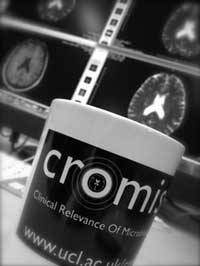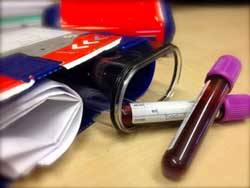Patient information
What is the CROMIS-2 study trying to find out?

The research question is: "Do small areas of bleeding in the brain (microbleeds) in patients with stroke due to an irregular heartbeat predict the risk of bleeding on a common blood-thinning medicine (anticoagulants)?"
What is the research about?
Anticoagulants, blood thinning medication, are often used after a stroke due to blood vessel blockage to prevent further strokes. It is very effective, but has a rare side-effect of bleeding into the brain: though this side-effect is uncommon, it may be very serious and could counteract any treatment benefit. Unfortunately at the moment it is hard to predict who will suffer a brain haemorrhage on anticoagulants. A special brain scan, called gradient-echo magnetic resonance imaging (MRI), shows tiny areas of previous bleeding (called "microbleeds") around leaky, fragile blood vessels.
Recent research suggests that having microbleeds increases the risk of suffering a bleed into the brain after treatment with anticoagulants. Some people with stroke could therefore be receiving a risky treatment unnecessarily, but we do not know this for sure. To find out if this theory is correct, a large number of stroke survivors started on anticoagulants need to be studied using gradient-echo MRI scans before treatment, and then followed up. This needs collaboration between a number of different hospitals throughout the UK to definitively answer this important question.
We will invite participants to have blood taken for genetic studies to see if any genetic variations make people more susceptible to microbleeds or brain haemorrhage after taking anticoagulants.
How will the research have an impact on stroke survivors?
Our project aims to reduce their risks of brain haemorrhage when taking blood thinning treatment, which, although rare, is associated with very poor outcomes. The study will help to identify which stroke survivors put on anticoagulants are at high risk of bleeding, so that anticoagulants can be correctly given only to people who will be helped and not harmed by it.
How does the research build on research that has already been done?
Recent studies show that more people are being put on anticoagulants than ever before, and that this is causing more complications from brain haemorrhage. Researchers have found that stroke survivors who developed a brain haemorrhage on anticoagulants have more microbleeds in their brains than patients on anticoagulants without any history of brain haemorrhage.
Our study will help to definitively determine whether anticoagulants should be avoided in patients with microbleeds because of the high risk of brain haemorrhage.
About the researchers
What experience in stroke research do the people have who are running the study?

The Stroke Research Group at Queen Square has extensive experience in successful published research related to many aspects of stroke, including microbleeds. Professor Brown is an internationally recognized expert in running successful multicentre clinical trials in stroke survivors. Dr Werring commenced studies on microbleeds in 2002, funded by the Stroke Association. He provided the first published data on the link between microbleeds and cognitive (e.g. memory and planning) problems and conducted the first systematic UK study of the frequency of microbleeds in a stroke clinic. Professor Brown is the Director of the Thames Local Research Network for Stroke.
The UCL Institute of Neurology is one of the most successful brain scanning research institutions in Europe, which should ensure the highest quality of the research. Professor Lip is a cardiologist who is recognized as a world expert in atrial fibrillation and stroke prevention. Rustam Al-Shahi Salman is running randomised trials in haemorrhagic stroke at Edinburgh University, which has an international reputation in stroke research.
Professor Yousry and Dr Jager have extensive experience in imaging research in stroke. Professor Hardy and Dr Houlden are internationally renowned experts in brain disorder genetics. Dr Cohen is a specialist in blood thinning (anticoagulation) with a major research interest in making anticoagulants treatment as safe as possible.
How will the research be carried out?
What does the research involve for people taking part?

The study will be conducted in about 50 hospitals across the UK. 1000 people with stroke or transient ischaemic attack (or "mini stroke") and started on anticoagulants will be approached by a research fellow or stroke research nurse and be invited to take part. Those people who consent will have a brain MRI scan at baseline, a blood test for genetic analysis, and simple memory testing if they agree. After their discharge from hospital, patients will be followed up by postal questionnaire or telephone at 6 months, 12 months and 24 months.
After 2 years of follow up, we may organise them to come for an assessment in clinic at their local hospital.
We will ask to be informed by the person or their GP if any serious symptoms (e.g. of another stroke or brain haemorrhage) occur at any time during the study, and we will find out from medical admission records what has happened, or if they are well enough, they will be invited to their local hospital for an assessment in person.
What information will you collect, and how will you use it?

We will collect information about microbleeds from the MRI scan, and from the optional genetic blood test and memory tests. Information about their stroke and their medical history will be recorded. The follow up questionnaire, by post or telephone interview, we will ask questions about any new stroke-like symptoms and current medications.
At 2 years, patients may be invited to a clinic in their local hospital (or before this if they develop any worrying symptoms related to stroke). They will have a clinical examination, and a repeat memory testing if they consented for it at the start. We will use this information in statistical analyses to investigate which factors best predict the risk of brain haemorrhage in people taking anticoagulants.
How will you keep the people that took part informed about progress and results?
We will inform each person who took part of the results of the study when all the data are collected and the results have been analysed. Participants will not be informed of the genetic results unless they ask for them. This website will provide up to date information about progress of the study.
What happens when the project is finished?
What will you do with the information you collected from people who took part?
Data is protected by confidentiality rules and will be safely kept in password-protected computers. Data will never be given to people who are not authorized to work on the project with appropriate supervision. A backup copy of the study data will be kept locked away for 5 years. Data might be used to answer future research questions about microbleeds.
Glossary
- MRI: magnetic resonance imaging - a technique to safely create detailed images of the brain
- Microbleed: a tiny area of bleeding in the brain only seen well on a special type of scan, termed gradient-echo MRI
- Anticoagulants: blood-thinning drugs often prescribed for stroke survivors if their stroke was thought to be related to a blood clot from the heart
 Close
Close

